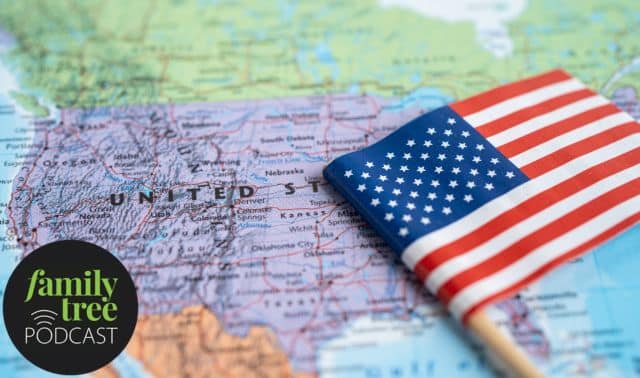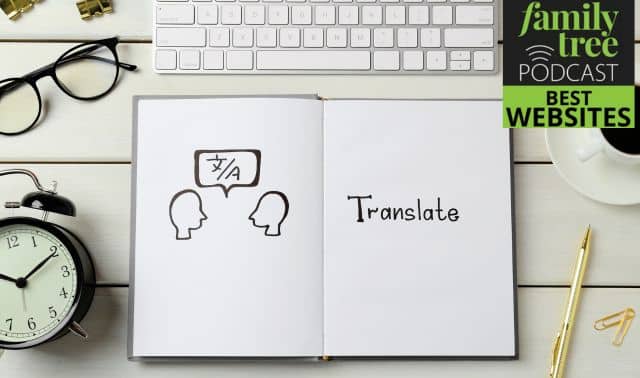Sign up for the Family Tree Newsletter! Plus, you’ll receive our 10 Essential Genealogy Research Forms PDF as a special thank you.
Get Your Free Genealogy Forms
"*" indicates required fields

This month we’re discussing unusual immigration records, plus find out which websites are best for saving and sharing your research.
Ep. 124: September 2018
In this episode:
This Month in Family History
Family Tree editor Andrew Koch shares a genealogically important event that took place this month in years past – the Naturalization Act of 1906.
Feature
Our guest Rich Venezia is the founder of Rich Roots Genealogy. He specializes in 20th-century immigrant ancestry, and he assists clients with dual citizenship applications for Ireland and Italy. He’s a proud Italian dual citizen, and spoke about “How to Grow Empathy From Uncovering Your Roots” at TEDx Pittsburgh 2017. He was a member of the research team of the PBS TV show Genealogy Roadshow for two seasons, and consulted on The Travel Channel’s “Follow Your Past”.
DNA Deconstructed
Shannon Combs-Bennett answers the question: “Why don’t I show DNA for a region that I know I have ancestors from?”
Keep in mind that these results show you only the information you inherited from your ancestors. Due to a process called recombination, the DNA passed down to each generation is a new combination of genes and only a portion of the parent’s DNA. This means your genetic family tree and genealogical family tree will not match 100%. It all depends on what you inherited from your parents, they inherited from their parents, and so on back.
Ethnicity analysis is constantly begin refined. We are lucky if you think about. As we study genealogy and genetics we are also watching science develop. As the companies learn more about ethnicity traits and control groups they put out new information on their websites. For example, AncestryDNA released new ethnicity results to their customers the beginning of September. If you test there you can compare your old results with the new ones. It is obvious by looking at them side by side how they are refining and developing the science.
The take away is this: ethnicity results will only show what you inherited. Since the science is being developed and refined as we speak expect your results to change over time.
Best Genealogy Websites
Author Dave Fryxell shares the Best Websites for Saving and Sharing from the 101 Best Websites list.
Sharing and Social Media
Facebook: Recent controversies aside, the world’s biggest social-networking site can connect you with cousins as well as with your favorite genealogy institutions.
GEDMatch: Sort of a matchmaking site for genetic genealogy, here free registration lets you match your autosomal DNA (atDNA) results with others who’ve uploaded data from AncestryDNA, 23andMe or Family Tree DNA’s Family Finder.
Geni: Geni’s World Family Tree connects more than 120 million individuals. It’s free to add your own family and invite kin to collaborate.
Pinterest: Share anything visual with this online tagboard, from family photos to census images.
YouTube: Your favorite Family Tree Magazine authors, “Genealogy Roadshow” and other family-history TV shows, Ancestry experts and more are among the quarter-million videos that pop up when you search for “genealogy.” Join the DNA Detective Facebook group. There you’ll find Search Angels who will make contacts for you as a third party.
Stories from the Stacks
Larry Richmond is the Manager of the Genealogy and Local History Department of the Public Library of Cincinnati and Hamilton County where he has worked since 2004, and his responsibilities include the library’s digitation efforts and special collections. The digital collection currently includes over 56,000 items, and be sure to check back because they add 20,000 pages every month!
We discuss three collections in today’s episode:
The Disabled American Veterans is a preeminent veterans organization that was founded in Cincinnati in 1919. We have digitized their newsletters from the 1940s and 1950s. So, if anyone is interested in the DAV, veterans issues, or even specific veterans, this is an excellent resource.
Indigent Burial Records for Hamilton County Ohio. Spanning from 1931 through 1990, these fascinating records shed light on those whose families could not afford to bury them.
African American Society Columns is a project that we’ve just gotten started but will be a tremendous resource for genealogist researching African American relatives in Cincinnati in the late 19th Century. From 1884 through 1896 the Cincinnati Commercial Gazette, Cincinnati Enquirer, and the Cincinnati Times-Star each ran a weekly “Our Colored Citizen” column. This is a remarkable record of the church, civic, fraternal organizations, and businesses of leading African Americans of the time.
Stories from the Stacks
This Just In! Editor Diane Haddad tells us about a new book at Family Tree Magazine called the Family Tree Factbook.
Your Host: Lisa Louise Cooke
Listen to Lisa Louise Cooke’s Genealogy Gems and Genealogy: Family History Made Easy podcasts in iTunes and visit her website for great research ideas, podcast episodes and videos.
Have fun climbing your family tree!





